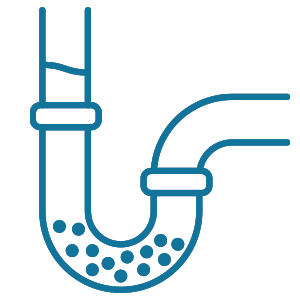We’ve all been there. Whether it be in the bathroom or the kitchen, a blocked drain is an inconvenience and can often cause water to back up the sink, resulting in cleanup being needed. If you want to know more about blocked drains, then click here . This article will explain how blocked drains work and what you should do if you find yourself in one.
What Causes a Blocked Drain?
One of the most common causes of blocked drains is a build-up of solid materials such as food, grease, hair, and soap scum. These materials can collect on the walls of pipes and eventually cause them to become clogged. In some cases, tree roots can penetrate pipes and block the flow of water. Another potential cause of blocked drains is a collapsing pipe due to age or blockage of the pipe with debris.

Perform a DIY Assessment Before Calling a Professional Plumber
When you notice that your drains are slow to empty or unable to clear fully, it’s important to perform a basic assessment of the situation before calling in a professional. The first thing to check is whether your outside waste system is free from blockages – this may require you to use a rod or snake to manually remove any obstructions. You might also want to consider replacing or cleaning your P-trap, if necessary, as a blocked P-trap is a common cause of blocked drains.
Signs That You Have a Blocked Drain
When trying to determine if you have a blocked drain, look out for certain signs that indicate the severity of the blockage. These signs include: gurgling sounds when you run water, overflowing sinks, bad odors emanating from drains, and pools of water collecting near drains. If you experience any of these issues, it’s important to take action quickly and call a plumber as soon as possible.
The Benefits of Professional Drain Clearing Services
Professional drain clearing services provide a number of benefits over attempting a DIY project. For starters, a plumber may be able to identify the source of the blockage and offer a solution to the problem. Additionally, a plumber can utilize specialized equipment such as a hydro-jetter to offer you quick and effective relief from your blocked drain without risking further damage to your plumbing system.
How to Maintain Your Drains
In order to avoid ever having to deal with a blocked drain, it’s important to put measures in place to maintain your plumbing system. Firstly, ensure that you never pour oils, fats and grease down the sink – these materials solidify and can potentially lead to blockages. Additionally, you should dispose of paper towels and other non-flushable items in the bin instead of the toilet. Finally, try to observe regular maintenance using one of the many available chemical-free drain cleaning products.
The Bottom Line
Blocked drains can cause significant disruption to your daily routines. However, by taking a proactive approach you can minimise the risk of ever experiencing a blockage. Ensure that you never flush anything down the toilet apart from human waste and toilet paper, monitor the performance of your drains, and never pour fats, oils, and grease down your sink. If, despite following these steps, you still find yourself dealing with blocked drains, then don’t hesitate to contact a professional plumber who will be able to help identify the source of the problem and provide a solution.

